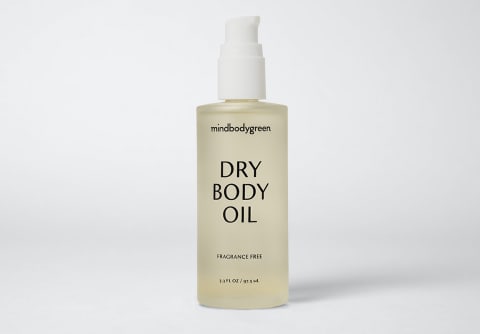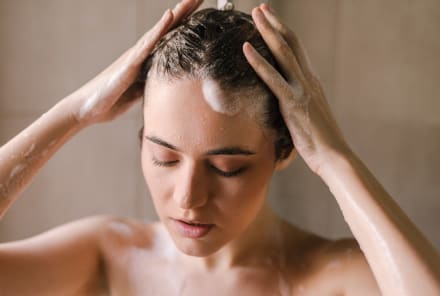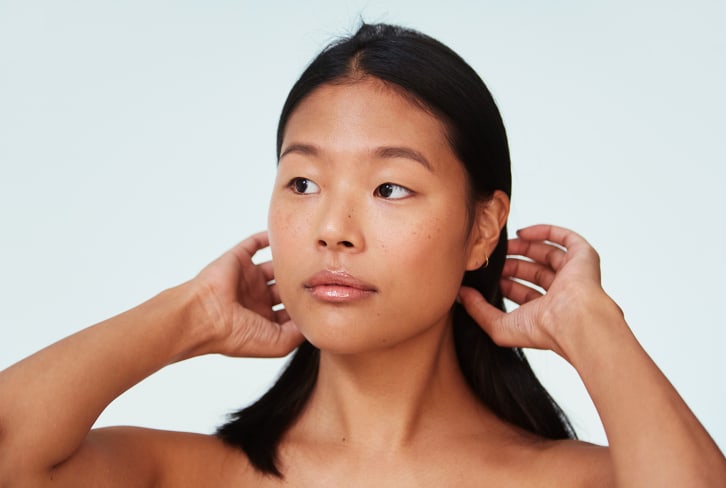Advertisement
5 Oils To Look For To Treat Aging Skin & Fine Lines


As we age, our skin gets drier and more wrinkly. This is just a natural part of the process—as the body slowly produces fewer lipids, humectants, proteins, and various other aspects of the moisture barrier.
This process can become accelerated through damage—such as unprotected UV exposure, prolonged inflammation, and barrier dysfunction. Essentially, everyone's skin can become drier with time, but if we're not careful, our habits can make it worse.
One of my favorite ways to keep hydrated is to top my skin with nutrient-dense oils to help trap moisture in the skin. There are many types of oils to pick from—I prefer a blend of several to target different concerns. Here, some of my favorites to look for on an ingredient list:
Safflower seed oil
An incredible carrier oil that's non-greasy and effortlessly spreadable, safflower seed oil is an elegant base option—especially for those with aging skin. The oil is extraordinarily high in essential fatty acids, specifically omega-6 fatty acids1 (it constitutes about 70% of the oil makeup).
Research shows that omega-6 fatty acids are the most abundant fatty acid in the epidermis (top layer of the skin) and, therefore, play an integral role in the skin barrier function2. In fact, research shows that omega-6 fatty acids can help deal with inflammation in multiple layers of the skin—meaning that they have a deep impact on skin health.
So, what does this mean for skin? Well, supporting a strong barrier is the most important way to keep skin looking healthy and vibrant. When the skin barrier is damaged, it triggers inflammation. This can lead to multiple signs of premature aging, such as fine lines, crepiness, and irritation.
It also can help protect collagen, research shows. A 2020 study found that safflower seed oil and this compound can reduce damage caused by UVB exposure, specifically blocking damage to collagen. They found that one component in safflower seed oil, acacetin, was able to block an enzyme in the skin that's responsible for breaking down collagen.
Bonus: It's also noncomedogenic, in case you deal with body breakouts or adult acne.
Rosehip seed oil
Rosehip oil is often touted for its wrinkle-fighting benefits, and for good reason. It contains vitamins C and A3, two antioxidants very important for skin health. Research shows that this robust antioxidant profile is helpful for fighting oxidative stress4, which can lead to premature aging.
Vitamin C, in particular, is an essential part of the collagen synthesis process. Vitamin C helps the skin build collagen—and it also protects existing collagen from free radicals.
Vitamin A contains retinoic acid5 (the active ingredient in retinol products), which can upregulate collagen production, stimulate skin cell turnover, and help deal with photodamage. However, we should note that the amount of retinoic acid in natural vitamin A isn't as strong as prescription or OTC retinols, so you won't get the exact same benefits, but it's certainly worth adding to your routine.
Vitamin E
One of the most famous ingredients for skin care, vitamin E, is a lipid-soluble antioxidant that is excellent in healthy aging oils. In fact, it's the most prevalent fat-soluble vitamin in the skin6—making it essential for maintaining skin health.
Most notably, vitamin E has powerful anti-inflammatory properties7 on the skin and can also help inhibit free radical damage. A recent meta review found that topical application can prevent the formation of dark spots8 and the effects of photodamage (it's worth noting that up to 80% of signs of aging can be attributed to sun exposure8).
It also supports the collagen production process—and can inhibit collagen damage. Vitamin E protects against collagen cross-linking9, a process that plays a role in skin aging. Here's how: When collagen cross-links10, it becomes hard and stiff.
It also helps manage the skin barrier11, which functions to protect the body from irritants, allergens, and excess water loss.
Prickly pear seed oil
Prickly pear (also known as Opuntia ficus-indica12) is a species of cactus native to the Americas. The fruit and seeds can be cold-pressed into a nutrient-dense oil, chock-full of omega fatty acids, polyphenols, and a spectrum of vitamins like E, A, K, and D.
To start, it contains three kinds of fatty acids13 (linoleic, oleic, and linolenic), which the skin uses to bolster barrier strength.
The antioxidant profile can help neutralize free radicals from oxidative stress, inflammatory processes, and UV rays. Considering up to 80% of the signs of skin aging14 happen due to UV damage, antioxidant-rich oils are a solid investment for any skin care routine.
Jojoba oil
If you want something easy and no-fuss that is the perfect middle-ground texture, jojoba oil is what you need. In fact, the oil is pretty close structurally15 to our own natural oils.
The oil comforts the skin barrier and helps trap in moisture—reducing transepidermal water loss. Plus, it's rich in beauty-boosting ingredients16 like vitamin E, vitamin B complex, copper, and zinc. Thanks to its robust nutrient profile, it's been shown to have many healthy aging benefits. In fact, research has even found that jojoba oil stimulates collagen synthesis17.
18 Sources
- https://www.tandfonline.com/doi/abs/10.1080/14786419.2014.971316?journalCode=gnpl20
- https://pubmed.ncbi.nlm.nih.gov/1498013/
- https://www.tandfonline.com/doi/full/10.1080/10942912.2013.777075
- https://www.ncbi.nlm.nih.gov/pmc/articles/PMC5485961/
- https://www.ncbi.nlm.nih.gov/pmc/articles/PMC9324272/
- https://lpi.oregonstate.edu/mic/health-disease/skin-health/vitamin-E
- https://www.ncbi.nlm.nih.gov/pmc/articles/PMC4976416/
- https://www.frontiersin.org/articles/10.3389/fphar.2022.1006198/full
- https://www.ncbi.nlm.nih.gov/pmc/articles/PMC3583891/
- https://www.ncbi.nlm.nih.gov/pubmed/3130057
- https://www.ncbi.nlm.nih.gov/pubmed/17719081
- https://www.sciencedirect.com/topics/agricultural-and-biological-sciences/opuntia-ficus-indica
- https://www.ncbi.nlm.nih.gov/pmc/articles/PMC8401162/
- https://www.ncbi.nlm.nih.gov/pmc/articles/PMC3790843/#:~:text=Clinical%20signs%20of%20aging%20are,of%20visible%20facial%20aging%20signs.
- https://www.sciencedirect.com/topics/agricultural-and-biological-sciences/jojoba-oil
- https://www.ncbi.nlm.nih.gov/pubmed/24442052
- https://www.ncbi.nlm.nih.gov/pubmed/21211559
- https://www.jaad.org/article/S0190-9622%2806%2901198-4/fulltext
Watch Next
Enjoy some of our favorite clips from classes
Enjoy some of our favorite clips from classes
What Is Meditation?
Mindfulness/Spirituality | Light Watkins
Box Breathing
Mindfulness/Spirituality | Gwen Dittmar
What Breathwork Can Address
Mindfulness/Spirituality | Gwen Dittmar
The 8 Limbs of Yoga - What is Asana?
Yoga | Caley Alyssa
Two Standing Postures to Open Up Tight Hips
Yoga | Caley Alyssa
How Plants Can Optimize Athletic Performance
Nutrition | Rich Roll
What to Eat Before a Workout
Nutrition | Rich Roll
How Ayurveda Helps Us Navigate Modern Life
Nutrition | Sahara Rose
Messages About Love & Relationships
Love & Relationships | Esther Perel
Love Languages
Love & Relationships | Esther Perel



















